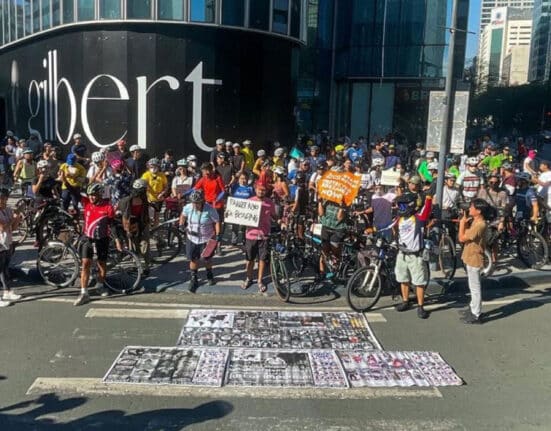CYCLING communities are bent on continuing their fight to stop the impending conversion of bike lanes along Ayala Avenue in Makati City into shared lanes to be called “sharrows,” and they’re hoping authorities will listen to their plea.
Last Sunday (February 12), over 200 participants, consisting mostly of cyclists with a few pedestrians and users of cars and electric kick scooters, gathered in the city’s business district to protest the move.
A group of cyclists said the move to convert the bike lanes is a “step backward” by the country’s financial district, considering cities in other countries have been staunchly protecting and advocating the use of bikes as a form of transportation.
It would also affect the safety of the bicycle users, it said.
Bike lanes to ‘sharrows’
Make It Makati, the collaboration of the city government, Ayala Land Inc. and the Makati Commercial Estate Association (MACEA), earlier announced that the bike lanes along Ayala would be converted to shared lanes or “sharrows” starting February 15.
Photo courtesy: First Bike Ride
“This initiative is being done to better serve the commuting public and in preparation for the provision of more and bigger transit sheds along Ayala Avenue,” Make It Makati said in a statement.
The conversion of bike lanes to sharrows is said to be influenced by the increasing number of commuters taking public transport.
Republicasia has reached out to MACEA as well as Ayala Land, Inc. to get their response to the cyclists’ plea, but has yet to receive a response.
Bikers’ appeal
In an exclusive interview with republicasia, 22-year-old cyclist Earl Decena explained why the cycling community is determined to protect the bike lanes.
Decena said cyclists simply want the proper division of public transport lanes and bike lanes in the financial district to ensure their safety.
Photo courtesy: First Bike Ride
Cyclists would be at risk if they have to share their lane with other vehicle users, he said.
“Ang talagang value namin, ang pinapahalagahan po namin dito is yung kaligtasan nung mga gumagamit ng bicylce lane dahil marami na pong mga pagaaral galing po sa mga iba ibang syudad sa mundo na ang sharrow o shared lane ay mas delikado pa kesa sa mas delikado pa,” he said.
Make it Makati’s plan is to allocate three lanes for private vehicles and one lane for commuters and bicycle users, which is objectionable, he said.
“Ang gusto po nilang mangyari, tatlong lane ibibigay sa pribadong sasakyan at isang lane maghahati ang mga commuter at bicycle commuter,” he said.
“Yung paghahati po na yun kumbaga ang isa sa mga tinututulan talaga namin,” he added.
Efforts to be heard
Apart from the protest, there are individual efforts from concerned citizens and cycling groups to reach out to Makati officials in hopes of aborting the implementation of the sharrows, he said.
The call for more space for cyclists does not apply only in Makati, but in other cities as well, he added.
Photo courtesy: First Bike Ride
Meanwhile, Decena said he and thousands of citizens who prefer two wheels for mobility are also continuing their push to promote cycling as an active mode of transport.
They want people to see the use of bicycles as a healthier alternative in all aspects because of its organic nature and function.
“Ang mahalaga rin po kasi is nakita rin po namin ang cycling as a way to promote freedom in the sense na wala kang carbon emissions, so mas nakakaimprove ito sa health,” he said.
“Mas nakakatulong din siya sa congestion, kasi for every person na nagbicyle, naniniwala kami na it’s one less car on the road,” he added.









